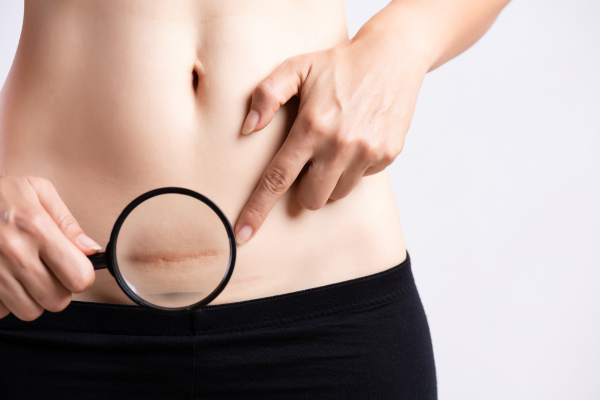Collagen and wound healing after surgery

Collagen and wound healing after surgery
The use of food supplements with collagen is increasing more and more. In the body, collagen makes up a large proportion of all protein found in the body, more precisely a third. Therefore, it is perhaps not so strange that collagen is needed for several different tissues in the body, for example the skin, and that people therefore choose to take it as a dietary supplement.
After undergoing an operation, you naturally want the wound you get afterwards to heal well so that the scarring does not become unnecessarily rough. We will therefore in this article go through the role collagen has in the healing of wounds after an operation.
Why is collagen important for wound healing in the skin?
To begin with, we can go through, in a very simplified manner, how wound healing occurs after an operation.
During the first four days after surgery, the movement of inflammatory cells to the wound is stimulated. Furthermore, immune cells help to clean the wound from, among other things, bacteria. The inflammatory cells secrete growth factors that stimulate connective tissue cells to move to the wound and secrete type III collagen (the most abundant type of collagen in soft tissues after type I collagen), which will give the wound natural strength after previously being held together only with stitches.
During the second week after surgery, type I collagen is also produced. The procollagen, i.e. the precursor to collagen, splits and forms fibrils, which further increases the natural strength of the wound. After 3-5 weeks, the fibrils are cross-linked and form fibers which act as a bridge between the edges of the wound. In the sixth week, the collagen fibers begin to mimic undamaged skin. During this period of time, the risk of the wound tearing open is low and therefore you can usually start practicing physical activity again at this time.
Which nutrition affects wound healing and the production of collagen?
Wound healing can be affected by a number of different factors, for example age, smoking, alcohol consumption and diabetes. Of course, the nutrition you get is also important during this process. During wound healing, energy is needed, which we get in the form of carbohydrates, protein and fat. Of these three components, protein is the most important in the wound healing process, among other things for the formation of collagen to function normally. Protein consists of amino acids, and collagen mainly consists of the amino acids proline, hydroxyproline and glycine. During the formation of collagen, the amino acids lysine and proline are required to be hydroxylated. Hydroxylation is a process in which a hydrogen atom in a hydrocarbon is replaced by a hydroxyl group (one oxygen and one hydrogen, -OH). Iron and vitamin C are other components needed for collagen production.
Furthermore, the amino acids arginine and glutamine are important in wound healing as they are important for the immune system's role in this process. Zinc also has an important role in the wound healing process. So if you have a deficiency in any of the aforementioned nutrients, it can result in impaired wound healing.
In one study, patients undergoing hernia surgery were given a vitamin C, arginine, glutamine, and zinc supplement for 14 days before surgery, and then for another 14 days after surgery. This resulted in enhanced collagen production, compared to patients who only received a placebo before and after surgery.
Are collagen supplements good for wound healing after surgery?
If you want to take food supplements with collagen, it can help at least as well as food supplements with nutrients that promote collagen production in the body. In a study on collagen supplementation and wound healing after an operation, patients were first divided into two groups based on whether they had any medical condition that could affect the wound healing process or not, i.e. a "normal group" or a "disturbed group". Then, the participants in the two groups were randomly divided into two more groups, where one received dietary supplements with bioactive collagen peptides, and the other received a placebo. The group that received the dietary supplements with collagen and belonged to those who had a condition that could affect the healing process received a larger dose, and for a longer period of time, compared to the people in the so-called "normal group". The people in the placebo groups received different doses of maltodextrin, which is a carbohydrate made from starch. The result showed that those who received collagen peptides (both in the "normal" and "disturbed" groups) had a positive effect on wound healing.
Here at Celloptimum you can buy dietary supplements with hydrolysed collagen .
What foods contain collagen?
Foods that are naturally rich in collagen are animal products, such as meat, eggs, chicken, bone broth, gelatin and fish. However, the collagen mainly occurs in the parts of the animal we do not normally eat, for example in bones, cartilage and skin. Therefore, bone broth can be an extra good source.
To promote the body's production of collagen, you can increase your intake of foods rich in vitamin C and iron. Vitamin C also increases the absorption of iron in food, so it is especially good to eat these together! Examples of foods rich in vitamin C include orange, lemon, and other citrus fruits, as well as kiwi, peppers, broccoli, Brussels sprouts, strawberries, tomatoes, and kale. Iron is found in, among other things, meat, beans, lentils, nuts, dried fruit, kale, fish and quinoa, as well as other grains with a high proportion of whole grains.
Zinc is, as we mentioned earlier, also a mineral that is important for the wound healing process. Nuts and seeds are rich in zinc, especially pumpkin seeds and sesame seeds. These can advantageously be soaked to increase the absorption of zinc. Other examples of foods that contain zinc are oysters, legumes, meat and whole grains.
As we have previously also gone through, it is important to eat enough, especially of protein, because wound healing after an operation requires energy. To get the amino acids that are important for collagen production and the wound healing process, you should eat protein-rich foods, such as meat, chicken, eggs, fish, legumes, nuts and seeds. To optimize your intake of all amino acids on a plant-based diet, it is good to get both legumes and grain products (preferably with whole grains), for example beans and whole grain rice. This is because cereals contain higher levels of the amino acids methionine and cysteine compared to legumes, but less lysine. On the contrary, legumes contain more lysine, but a lower proportion of methionine and cysteine. However, quinoa, hemp seeds and soy protein are examples of plant-based foods with a complete amino acid profile.





